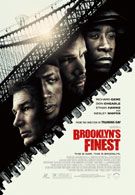At the very least, you've got to admire screenwriter Michael Martin's passion. He was a lowly MTA employee in New York City when he wrote Brooklyn's Finest, with the obvious intention of emulating the great New York cop dramas of generations past. The themes of betrayal, of disillusionment, of living life undercover and of putting your life on the line for strangers are very, very well-worn in other films of the genre, but Martin clearly worked hard to put his own spin on the story, interlocking three short stories about three different cops working the beat in the sprawling and nasty borough (hey, I live in Brooklyn-- I'm allowed to call it names).
Unfortunately, good intentions don't always make for good screenwriting, and strong work from a cast can't overcome a screenplay hampered by cliches and obvious twists. There's a reason it's taken over a year for Brooklyn's Finest to come to theaters following its 2009 Sundance debut; it's full of everything we've seen before but presented as if new, and absent the kind of electric energy or fearless performances that helped director Antoine Fuqua's earlier cop film, Training Day, overcome its own cliches. The central characters played by Ethan Hawke, Don Cheadle and Richard Gere spend the film moping and making bad decisions, only at the end doing anything that resembles powerful drama.
All working within the same precinct deep in Brooklyn, Eddie (Gere), Tango (Cheadle) and Sal (Hawke) are all cops with wildly different perspectives on their mean streets. Eddie is depressed after 22 years on the force (you know he's depressed because he wakes up, puts a gun in his mouth and does a shot of whiskey before his feet hit the floor), and has just a week left to go before the relief of retirement. Sal is struggling to raise a mess of kids and, in the film's opening scene, commits a murder to get his hands on dirty money. Tango has been operating undercover for years, and in that time has befriended drug lord Caz (Wesley Snipes) who, in his last sting before moving up to full detective, Tango is asked to rat out.
As they get mired deeper in their own traumas and issues, all three characters make increasingly dumb decisions-- for veteran cops, they should all know better than to get into half their messes. And while the lead three actors are usually charismatic on their own, they all seem trapped in their dull and actionless characters. Sideline characters like Ellen Barkin's fierce FBI agent, Brian F. O'Byrne's good-hearted cop and especially Snipes's complicated Caz make much bigger impressions than the lead characters we spend far more time with.
Fuqua does well capturing the rhythms of the housing projects where much of the action takes place, but seems incapable of recognizing the cliches and leaden dialogue that sink his film at every turn. For every powerful moment-- a cross-cut series of dangerous encounters, a heart-to-heart between Caz and Tango-- there are two more that ring utterly false. As the movie stretches out over two hours and leads to its preposterous conclusion, all the good intentions and successful part are mired in the nonsense that surrounds it. We may never be done with seeing cop dramas on the screen, but what we really don't need is more like this one.
Staff Writer at CinemaBlend
Most Popular




